21世纪大学英语综合教程第四册unit7翻译
全新版大学英语综合教程4课后习题翻译Unit3-7
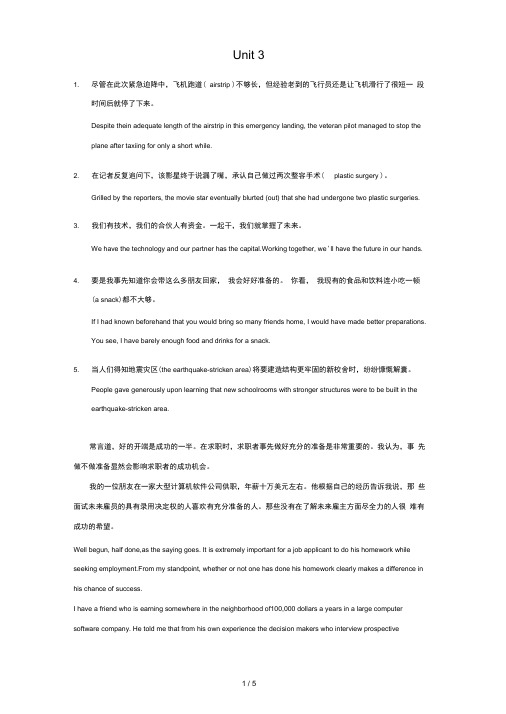
1. 尽管在此次紧急迫降中,飞机跑道( airstrip )不够长,但经验老到的飞行员还是让飞机滑行了很短一段时间后就停了下来。
Despite thein adequate length of the airstrip in this emergency landing, the veteran pilot managed to stop the plane after taxiing for only a short while.2. 在记者反复追问下,该影星终于说漏了嘴,承认自己做过两次整容手术( plastic surgery )。
Grilled by the reporters, the movie star eventually blurted (out) that she had undergone two plastic surgeries.3. 我们有技术,我们的合伙人有资金。
一起干,我们就掌握了未来。
We have the technology and our partner has the capital.Working together, we'll have the future in our hands.4. 要是我事先知道你会带这么多朋友回家,我会好好准备的。
你看,我现有的食品和饮料连小吃一顿(a snack)都不大够。
If I had known beforehand that you would bring so many friends home, I would have made better preparations.You see, I have barely enough food and drinks for a snack.5. 当人们得知地震灾区(the earthquake-stricken area)将要建造结构更牢固的新校舍时,纷纷慷慨解囊。
全新版21世纪大学英语综合教程4(第三版)课后翻译
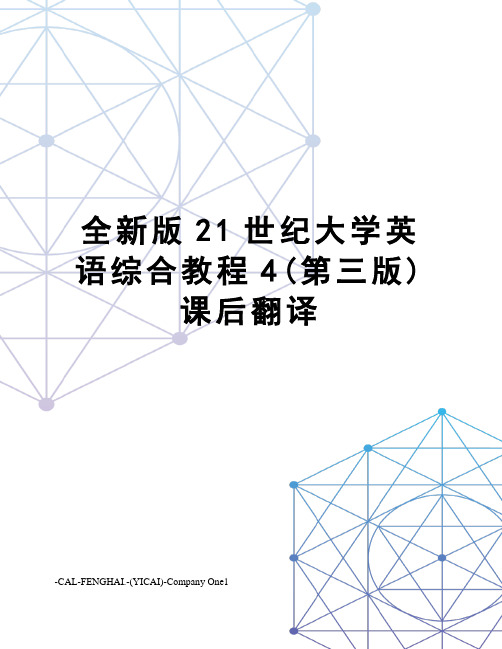
全新版21世纪大学英语综合教程4(第三版)课后翻译-CAL-FENGHAI.-(YICAI)-Company One1Unit 1这是西雅图海边阳光明媚、赤日炎炎的一天,穿越海湾能一眼望见远处的岛屿,其自然美景没有受到任何破坏。
人们躺在一片草坪上看书或和恋人相依,一阵充满活力的无伴奏的歌声从草坪的另一端传了过来。
原来是一家咖啡馆外面有4位男子正在唱着一首关于丘比特的情歌,每个人都有着不同的音域。
围了几圈的人群正摇摆着身体合着节奏拍手。
这家咖啡馆的星巴克徽标让我觉得有一点过时,直到有人提到这是世界上第一家开张的星巴克时我才恍然大悟。
我是因为最近的一次调查来到西雅图的。
这项调查是由位于伦敦的经济运转情况中心发起的,旨在了解在世界不同的地方发财致富究竟有多么容易或多么困难——如果不是发财致富,至少也是摆脱贫困。
Unit 2美国满足了我学业深造和职场历练的雄心。
我来的时候差不多是高中学历,而10年后,我拥有了研究生学位,也有了比较成功的职业生涯。
然而,前进的每一步都是通过令人精疲力竭的奋斗取得的。
我的大学学费一部分是通过打多份报酬极低的零工挣来的。
毕业以后,我很幸运地找到一份工作。
可是,适应企业文化需要付出另一种代价。
最初,我需要付出双倍的努力才跟得上。
渐渐地,我意识到如果缺乏自信,别人就不把你当回事儿,于是便学着装出一副自信满满的样子。
迫于裁员潮的威慑,我利用业余时间读了研究生,因为那是我所知道的能在保障工作方面取得优势的唯一办法。
当我有资格申请公民身份时,又花了一大笔律师费,并且忍受了充满压力的数年时光,努力应对种种纷繁复杂的情况以获得在美的永久居住权。
Unit 4我想,令人目眩神速的初恋也许会融入血液中,但经得起考验的爱则永驻心头。
从这个意义上说,爱比躯体更具活力。
爱使我们变得完整,赋予我们平安度过一生所需的一切。
我可以就这样数个小时一直端详着我的妻子。
海浪不断迸溅开来,冲击着她光光的脚丫。
这个世界有时因为伤害和痛苦而大煞风景,我却深深地感恩升起的旭日为我照亮了这样的真爱。
全新版大学英语(第二版)综合教程_第四册_Unit 7 The Nightmare and the Dreams

Peggy Noonan lives in New Y ork and writes a weekly column for The Wall Street Journal. This piece is taken from one of them. In it she reflects on her week and on life in the city. Writing less than a year away from the destruction of the World Trade Center, her thoughts are inevitably affected by that terrible event.--------------------------------------------------------------------------------佩吉·诺南住在纽约,每周为《华尔街时报》撰写专栏文章。
本文即其中一篇。
她在文章中反思了自己的一周以及这个城市的生活。
撰写此文时,离世贸中心被毁还不到一周年,她的思考不可避免地带有这一可怕事件的阴影。
The Nightmare and the Dreams-- How has Sept. 11 affected our national unconscious?Peggy Noonan1 It is hot in New Y ork. It is so hot that once when I had a fever a friend called and asked me how I felt and I said, "Y ou know how dry and hot paper feels when it's been faxed? That's how I feel." And how I felt all day yesterday. It is hot. We feel as if we've been faxed.--------------------------------------------------------------------------------梦魇与梦想——9·11事件如何影响了国民的潜意识?佩吉·诺南纽约真热。
最新全新版大学英语综合教程4第二版Unit7课文翻译
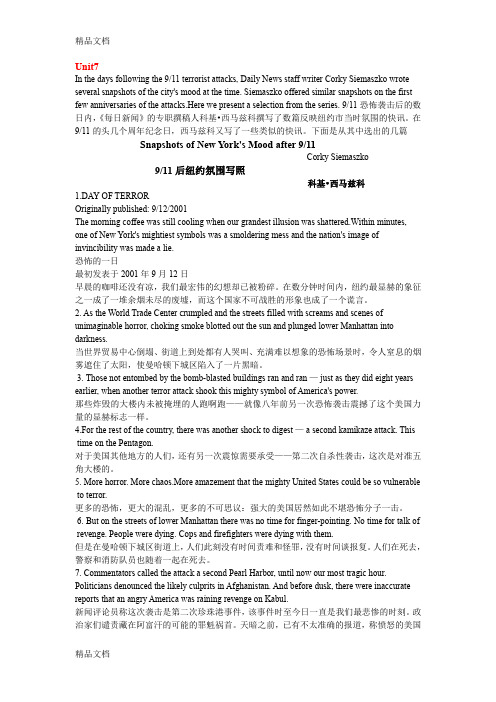
Unit7In the days following the 9/11 terrorist attacks, Daily News staff writer Corky Siemaszko wrote several snapshots of the city's mood at the time. Siemaszko offered similar snapshots on the first few anniversaries of the attacks.Here we present a selection from the series. 9/11恐怖袭击后的数日内,《每日新闻》的专职撰稿人科基•西马兹科撰写了数篇反映纽约市当时氛围的快讯。
在9/11的头几个周年纪念日,西马兹科又写了一些类似的快讯。
下面是从其中选出的几篇Snapshots of New York's Mood after 9/11Corky Siemaszko9/11后纽约氛围写照科基•西马兹科1.DAY OF TERROROriginally published: 9/12/2001The morning coffee was still cooling when our grandest illusion was shattered.Within minutes, one of New York's mightiest symbols was a smoldering mess and the nation's image of invincibility was made a lie.恐怖的一日最初发表于2001年9月12日早晨的咖啡还没有凉,我们最宏伟的幻想却已被粉碎。
在数分钟时间内,纽约最显赫的象征之一成了一堆余烟未尽的废墟,而这个国家不可战胜的形象也成了一个谎言。
2. As the World Trade Center crumpled and the streets filled with screams and scenes of unimaginable horror, choking smoke blotted out the sun and plunged lower Manhattan into darkness.当世界贸易中心倒塌、街道上到处都有人哭叫、充满难以想象的恐怖场景时,令人窒息的烟雾遮住了太阳,使曼哈顿下城区陷入了一片黑暗。
21世纪大学实用英语综合教程(第四册)课后翻译
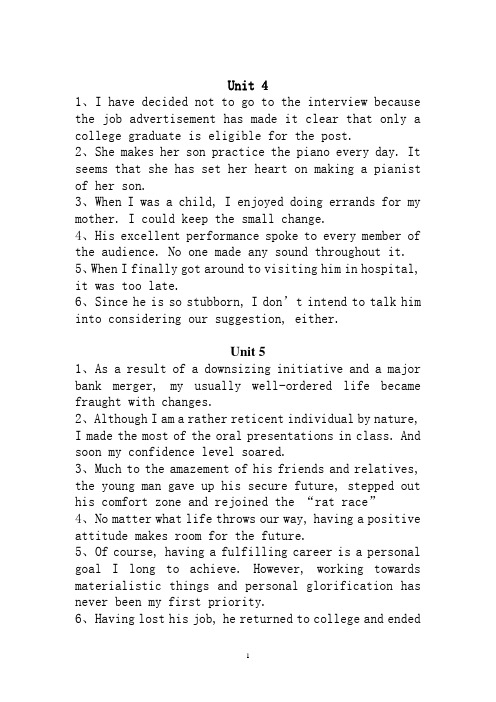
Unit 41、I have decided not to go to the interview because the job advertisement has made it clear that only a college graduate is eligible for the post.2、She makes her son practice the piano every day. It seems that she has set her heart on making a pianist of her son.3、When I was a child, I enjoyed doing errands for my mother. I could keep the small change.4、His excellent performance spoke to every member of the audience. No one made any sound throughout it.5、When I finally got around to visiting him in hospital, it was too late.6、Since he is so stubborn, I don’t intend to talk him into considering our suggestion, either.Unit 51、As a result of a downsizing initiative and a major bank merger, my usually well-ordered life became fraught with changes.2、Although I am a rather reticent individual by nature,I made the most of the oral presentations in class. And soon my confidence level soared.3、Much to the amazement of his friends and relatives, the young man gave up his secure future, stepped out his comfort zone and rejoined the “rat race”4、No matter what life throws our way, having a positive attitude makes room for the future.5、Of course, having a fulfilling career is a personal goal I long to achieve. However, working towards materialistic things and personal glorification has never been my first priority.6、Having lost his job, he returned to college and endedup acquiring a diploma.Unit 61、The new agreement is based on the original United Nations proposal.2、I’ll take this English test even if it takes weeks or months of preparation.3、In order to sell anybody anything in five minutes or less, you have to find common ground on which you and your client can stand together.4、Yes, you must work harder in your studies. But it does not mean that you have to sacrifice your health for better grades.5、We’re not here to talk about what divides us. We’re here to find the things that bind us together.6、In some cases you have to stoop to conquer. But does it mean that you have to sacrifice your integrity? Certainly not.Unit 71、While attending Columbia, Liming became good friends with Wang Ying, a twenty-year-old girl from Hong Kong. Encouraged by his instructor, John decided to make medicine his life’s career.2、Less than a month after he came to McGill University, Dr. Johnson submitted to the president a detailed plan for setting up a new laboratory in the biology department.3、After receiving the urgent cablegram from his former instructor, Dr. Drew immediately set to work and organized the “Blood for Britain” campaign.4、At the beginning of the following year, thousands of American soldiers were killed or injured on the battlefield.5、In a series of experiments, Dr. Drew discovered that plasma could be given to any patient regardless of blood type.。
Unit-7-College-Life新编大学英语第二版第四册课文翻译
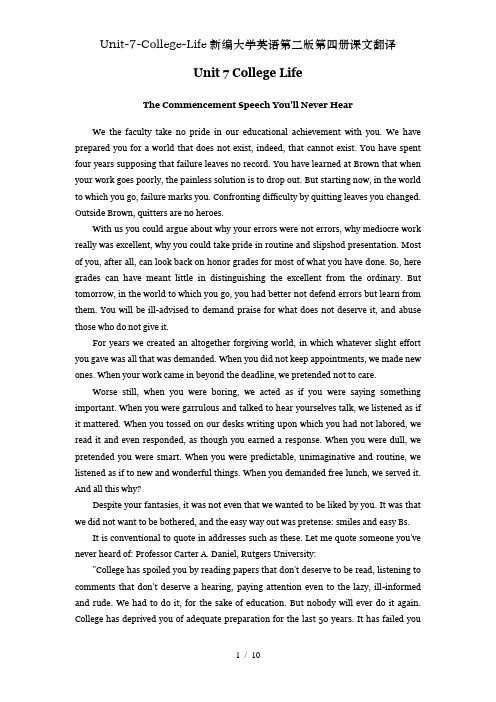
Unit 7 College LifeThe Commencement Speech You'll Never HearWe the faculty take no pride in our educational achievement with you. We have prepared you for a world that does not exist, indeed, that cannot exist. You have spent four years supposing that failure leaves no record. You have learned at Brown that when your work goes poorly, the painless solution is to drop out. But starting now, in the world to which you go, failure marks you. Confronting difficulty by quitting leaves you changed. Outside Brown, quitters are no heroes.With us you could argue about why your errors were not errors, why mediocre work really was excellent, why you could take pride in routine and slipshod presentation. Most of you, after all, can look back on honor grades for most of what you have done. So, here grades can have meant little in distinguishing the excellent from the ordinary. But tomorrow, in the world to which you go, you had better not defend errors but learn from them. You will be ill-advised to demand praise for what does not deserve it, and abuse those who do not give it.For years we created an altogether forgiving world, in which whatever slight effort you gave was all that was demanded. When you did not keep appointments, we made new ones. When your work came in beyond the deadline, we pretended not to care.Worse still, when you were boring, we acted as if you were saying something important. When you were garrulous and talked to hear yourselves talk, we listened as if it mattered. When you tossed on our desks writing upon which you had not labored, we read it and even responded, as though you earned a response. When you were dull, we pretended you were smart. When you were predictable, unimaginative and routine, we listened as if to new and wonderful things. When you demanded free lunch, we served it. And all this why?Despite your fantasies, it was not even that we wanted to be liked by you. It was that we did not want to be bothered, and the easy way out was pretense: smiles and easy Bs.It is conventional to quote in addresses such as these. Let me quote someone you've never heard of: Professor Carter A. Daniel, Rutgers University:"College has spoiled you by reading papers that don't deserve to be read, listening to comments that don't deserve a hearing, paying attention even to the lazy, ill-informed and rude. We had to do it, for the sake of education. But nobody will ever do it again. College has deprived you of adequate preparation for the last 50 years. It has failed youby being easy, free, forgiving, attentive, comfortable, interesting, unchallenging fun. Good luck tomorrow.That is why, on this commencement day, we have nothing in which to take much pride.Oh, yes, there is one more thing. Try not to act toward your co-workers and bosses as you have acted toward us. I mean, when they give you what you want but have not earned, don't abuse them, insult them, act out with them your parlous relationships with your parents. This too we have tolerated. It was, as I said, not to be liked. Few professors actually care whether or not they are liked by peer-paralyzed adolescents, fools so shallow as to imagine professors care not about education but about popularity. It was, again, to be rid of you. So go, unlearn the lies we taught you. To life!你将永远不会听到的毕业演讲1 我们这些教师对于在你们身上取得的教育成就一点都不感到自豪。
21世纪大学英语读写教程4课后翻译答案

21世纪大学英语读写教程(第四册)课后翻译答案Unit 11.美国人往往以从事的工作来对人们进行划分。
家庭和教育背景这些特点被认为是不太重要的。
Americans tend to define people by the jobs they have/do. Such characteristics as their family and educational backgrounds are considered less important.2.他决不妥协的个性是他再也无法容忍它的雇主,并最终递交了辞职书的原因。
His uncompromising personality explains why he could no longer put up with his employer and eventually submitted his resignation.3.如果你真想学好英语,你就必须投入大量的时间和精力,否则你就不会有任何进步。
对于其他课程也可以这么说。
If you really want to learn English well, you must put in a lot of time and energy, or you’ll go nowhere. The same can be said of other subjects.4.有些演员的名声靠的是他们天生的美貌,但是达斯汀?霍夫曼(Dustin Hoffman)尽管身材矮小(short stature), 还是出类拔萃,而使他与众不同的正是他精湛的演技。
Some actors’ fame is built on their innate beauty, but despite his short stature, Dustin Hoffman rose above and it is his excellent acting that sets him apart.5.他负责管理之后,我们发现他与前任(predecessor)有明显的不同:他有干劲和激情,想出了很多新点子,并把工作重点放在如何鼓舞我们的士气上。
21世纪大学英语读写教程第四册Unit 7 答案
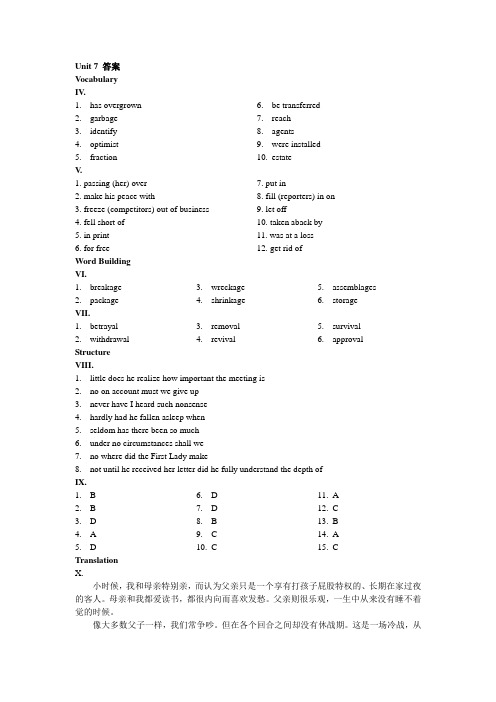
Unit 7 答案Vocabulary IV.1.has overgrown2.garbage3.identify4.optimist5.fraction6.be transferred7.reach8.agents9.were installed10.estateV.1. passing (her) over2. make his peace with3. freeze (competitors) out of business4. fell short of5. in print6. for free7. put in8. fill (reporters) in on9. let off10. taken aback by11. was at a loss12. get rid ofWord Building VI.1.breakage2.package3.wreckage4.shrinkage5.assemblages6.storageVII.1.betrayal2.withdrawal3.removal4.revival5.survival6.approvalStructureVIII.1.little does he realize how important the meeting is2.no on account must we give up3.never have I heard such nonsense4.hardly had he fallen asleep when5.seldom has there been so much6.under no circumstances shall we7.no where did the First Lady make8.not until he received her letter did he fully understand the depth of IX.1. B2. B3. D4. A5. D6. D7. D8. B9. C10.C11.A12.C13.B14.A15.CTranslationX.小时候,我和母亲特别亲,而认为父亲只是一个享有打孩子屁股特权的、长期在家过夜的客人。
21世纪大学英语第四册Unit7课文详解(读写教程)

21世纪⼤学英语第四册Unit7课⽂详解(读写教程) 导语:运⾏成功的公司⼀般都会有⾃⼰的⼯作规则,下⾯是⼀篇关于这⽅⾯的英语课⽂,欢迎⼤家来学习。
Running a Successful Company: Ten Rules that Worked for Me Sam Walton A whole lot has changed about the retailing business in the forty-seven years we've been in it—including some of my theories. We've changed our minds about some significant things along the way and adopted some new principles — particularly about the concept of partnership in a corporation. But most of the values and the rules and the techniques we've relied on have stayed the same the whole way. Some of them are such simple commonsense old favorites that they hardly seem worth mentioning. This isn't the first time that I've been asked to come up with a list of rules for success, but it is the first time I've actually sat down and done it. I'm glad 1 did because it's been a revealing exercise for me. I do seem to have a couple of dozen things that I've singled out at one time or another as the "key" to the whole thing. One I don't even have on my list is "work hard." If you don't know that already, or you're not willing to do it, you probably won't be going far enough to need my list anyway. And another I didn't include on the list is the idea of building a team. If you want to build an enterprise of any size at all, it almost goes without saying that you absolutely must create a team of people who work together and give real meaning to that overused word "teamwork." To me, that's more the goal of the whole thing, rather than some way to get there. I believe in always having goals, and always setting them high. I can certainly tell you that the folks at Wal-Mart have always had goals in front of them. In fact, we have sometimes built real scoreboards on the stage at Saturday morning meetings. One more thing. If you're really looking for my advice here, trying to get something serious out of this exercise I put myself through, remember: these rules are not in any way intended to be the Ten Commandments of Business. They are some rules that worked for me. But I always prided myself on breaking everybody else's rules, and I always favored the mavericks who challenged my rules. I may have fought them all the way, but I respected them, and, in the end, I listened to them a lot more closely than I did the pack who always agreed with everything I said. So pay special attention to Rule 10, and if you interpret it in the right spirit — as it applies to you — it could mean simply: Break All the Rules. For what they're worth, here they are. Sam's Rules for Building a Business: RULE 1: COMMIT to your business. Believe in it more than anybody else. I think I overcame every single one of my personal shortcomings by the sheer passion I brought to my work. I don't know if you're born with this kind of passion, or if you can learn it. But I do know you need it. If you love your work, you'll be out there every day trying to do it the best you possibly can, and pretty soon everybody around will catch the passion from you — like a fever. RULE 2: SHARE your profits with all your associates, and treat them as partners. In turn, they will treat you as a partner, and together you will all perform beyond your wildest expectations. Remain a corporation and retain control if you like, but behave as a servant leader in a partnership. Encourage your associates to hold a stake in the company. Offer discounted stock, and grant them stock for their retirement. It's the single best thing we ever did. RULE 3: MOTIVATE your partners. Money and ownership alone aren't enough. Constantly, day by day, think of new and more interesting ways to motivate and challenge your partners. Set high goals, encourage competition, and then keep score. Make bets with outrageous payoffs. If things get stale, cross-pollinate; have managers switch jobs with one another to stay challenged. Keep everybody guessing as to what your next trick is going to be. Don't become too predictable. RULE 4: COMMUNICATE everything you possibly can to your partners. The more they know, the more they'll understand. The more they understand, the more they'll care. Once they care, there's no stopping them. If you don't trust your associates to know what's going on, they'll know you don't really consider them partners. Information is power, and the gain you get from empowering your associates more than offsets the risk of informing your competitors. RULE 5: APPRECIATE everything your associates do for the business. A paycheck and a stock option will buy one kind of loyalty. But all of us like to be told how much somebody appreciates what we do for them. We like to hear it often, and especially when we have done something we're really proud of. Nothing else can quite substitute for a few well-chosen, well-timed, sincere words of praise. They're absolutely free — and worth a fortune. RULE 6: CELEBRATE your successes. Find some humor in your failures. Don't take yourself so seriously. Loosen up, and everybody around you will loosen up. Have fun. Show enthusiasm — always. When all else fails, put on a costume and sing a silly song. Then make everybody else sing with you. Don't do a hula on Wall Street like I did. Think up your own stunt. All of this is more important, and more fun, than you think, and it really fools the competition. "Why should we take those cornballs at Wal-Mart seriously?" RULE 7: LISTEN to everyone in your company. And figure out ways to get them talking. The folks on the front lines — the ones who actually talk to the customer — are the only ones who really know what's going on out there. You'd better find out what they know. This really is what total quality is all about. To push responsibility down in your organization, and to force good ideas to bubble up within it, you must listen to what your associates are trying to tell you. RULE 8: EXCEED your customers' expectations. If you do, they'll come back over and over. Give them what they want — and a little more. Let them know you appreciate them. Fix all your mistakes, and don't make excuses — apologize. Stand behind everything you do. The two most important words I ever wrote were on that first Wal-Mart sign: "Satisfaction Guaranteed." They're still up there, and they have made all the difference. RULE 9: CONTROL your expenses better than your competition. This is where you can always find the competitive advantage. For twenty-five years running long before Wal-Mart was known as the nation's largest retailer — we ranked number one in our industry for the lowest ratio of expenses to sales. You can make a lot of different mistakes and still recover if you run an efficient operation. Or you can be brilliant and still go out of business if you're too inefficient. RULE 10: SWIM upstream. Go the other way. Ignore the conventional wisdom. If everybody else is doing it one way, there's a good chance you can find your niche by going in exactly the opposite direction. But be prepared for a lot of folks to wave you down and tell you you're headed the wrong way. I guess in all my years, what I heard more often than anything was: a town of less than 50,000 population cannot support a discount store for very long. Those are some pretty ordinary rules, some would say even simplistic. The hard part, the real challenge, is to constantly figure out ways to execute them. You can't just keep doing what works one time, because everything around you is always changing. To succeed, you have to stay out in front of that change. New Words partnership n. the state of being a partner or partners, esp. in a business; a group of two or more people working, playing, etc. together as partners;a business with two or more owners 合伙(关系);伙伴(关系);合伙企业 common sense n. practical good sense gained from experience of life, not by special study 常识;(由实际⽣活经验得来的)判断⼒ commonsense a. having or showing practical good sense; sensible; practical; clear 有常识的;明⽩事理的;注重实际的;清楚明⽩的 revealing a. 有启迪作⽤的,发⼈深省的 reveal vt. make (facts, etc.) known 揭⽰,揭露;透露 enterprise n. a business company or firm 企业单位,公司 overuse vt. use (sth.) too much or too often 使⽤…过多;使⽤…过度 teamwork n. organized effort as a team 协同⼯作,配合 scoreboard n. a board on which a score is shown 记分牌,⽰分牌;(商业活动等的)记录牌 commandment n. 1. command; order 戒律;命令 2. (in the Bible) any of the Ten Commandments, ten laws given by God to the Jews (基督教⼗诫中的`)⼀诫 maverick n. a person with independent or unusual views 持不同意见者;持异议者 pack n. a gang or band of people ⼀帮⼈,⼀伙⼈ partner n. a person who takes part in an activity with another or others, esp. one of the owners of a business 合伙⼈,股东;伙伴,同伙 discount n. amount of money taken off the cost of sth. (价格等的)折扣 v. 打折扣出售(商品等) bet n. an arrangement to risk money, etc. on an event of which the result is doubtful 打赌 outrageous a. very shocking and unacceptable; very unusual and quite shocking 惊⼈的;肆⽆忌惮的,毫⽆节制 payoff n. a deserved reward or punishment 报偿;惩罚 stale a. no longer interesting or exciting because of having been heard, done, etc. too often before; not new 因陈旧⽽乏味的,过时的;没有新意的 cross-pollinate v. fertilize a plant with pollen from a different type of plant (使)异花传粉 predictable a. (of a person) behaving in a way that can be predicted 可预⾔的;可预料的,可预计的;(贬)按⽼⼀套办事的 empower vt. give (sb.) the power or authority to act 授权给 offset v. compensate for (sth.); balance (sth.) 补偿,抵消 competitor n. a person or an organization that competes against others, esp. in business 竞争者;⽐赛者;对⼿;敌⼿ loyalty n. the quality of being true and faithful in one's support of sb./sth. 忠诚,忠⼼耿耿 well-chosen a. carefully selected (used esp. of words) 仔细斟酌过的,合适的,恰当的 well-timed a. done, said, etc. at the right time or at an appropriate time 适时的,不早不晚的,及时的 hula n. Hawaiian performance that includes dance, gesture, and chanting (美国夏威夷的波利尼西亚⼥⼦跳的⼀种动作类似哑剧的)呼拉舞,草裙舞 stunt n. an unusual act designed to attract attention 惊⼈的表演,绝技;惊险动作 cornball n. (U.S. Slang) an unsophisticated person;rube;hick (美俚)头脑简单的⼈;乡巴佬;⼟包⼦ retailer n. a person who sells goods to the general public 零售商 ratio n. a relation between two amounts, which shows how many times one contains the other ⽐;⽐率;⽐例 inefficient a. (of a person or an organization) failing to make the best use of the available time and resources ⽆效率的 upstream ad. & a. in the direction from which a river, etc. flows; against the current 逆流(的);往上游(的) conventional wisdom the opinion that most people consider to be normal and right ⼀般⼈的意见,流⾏的看法 niche n. a suitable position, place, job, etc. 合适的位置(或地⽅、职务等) simplistic a. making difficult problems, issues, ideas, etc. seem much simpler than they really are, e.g. in order to conceal sth. (把复杂问题)过分简单化的;被过分简单化的 execute vt. do or perform (what one is asked or told to do) 实⾏,实施;执⾏,履⾏ execution n. 实⾏;执⾏,履⾏ Phrases and Expressions come up with find or produce (an answer, etc.) 提出,想出 single out choose (sb./sth.) from a group, e.g. for special attention 选出,挑出 at one time or another 在某个时候 go without saying be very obvious or natural 不⽤说,不⾔⽽喻 put...through make (sb.) experience (sth. very difficult or unpleasant) 使…经受 pride oneself on be proud of 以…⾃豪 in the end at last;finally 最终;最后 commit to devote oneself to (a certain cause, position, opinion, or course of action) 献⾝于 loosen up relax (使)放松 think up produce (an idea or a plan): invent or devise (sth.) 想出;设计出,发明 figure out come up with; come to understand or discover by thinking (美⼝)想出;理解,明⽩ bubble up move upward in or as if in bubbles; emerge from below 往上冒泡;涌现 stand behind be responsible for 对…负责 go out of business become bankrupt 破产;倒闭;歇业 wave down signal to (a vehicle or its driver) to stop, by waving one's hand 挥⼿⽰意(车辆、司机)停下 Proper Names Sam Walton 萨姆·沃尔顿(1918—1922,美国企业家) Wal-Mart 沃尔 — 玛特商场(由萨姆·沃尔顿于1962年开办) Wall Street 华尔街(美国纽约市曼哈顿区南部的⼀条街道,是美国⾦融机构的集中地,现常作美国⾦融市场或⾦融界的代名词)。
新标准大学英语综合教程4unit test(1-7)课后翻译

综合英语4课后翻译Unit 1我认为,选修第二专业并不合适每一位本科生。
我大学本科主修英语专业,大一时就开始辅修经济学了。
无疑,我是班里最用功的学生。
我竭尽全力想同时达到两个不同专业的要求,但还是有不及格的时候。
因为经济学需要良好的数学基础,我不得不花大量时间钻研数学,因而忽略了英语学习。
第二学期,《英国文学》及《宏观经济学》两门课不及格给我敲响了警种,这可是我一生中第一次考试不及格,这大大打击了我的自信心。
虽然我不是一个容易向命运低头的人,在暑假结束的时候,我还是决定放弃经济学,以免两个专业都难以完成。
当我只需修一个专业的时候,一切似乎又回到了正轨。
(if you ask me; odds; try as … might; sap one’s confidence; given that; bow to fate; come to a clo se; for fear that; now that)If you ask me, taking a second major isn’t good for every undergraduate. In my freshman year asa n English major, I took economics as my minor. By all odds, I was the most hardworking studentin my class. But try as I might to meet the requirements of the two different subjects, I stillcouldn’t do well enough to pass all the exams.Given that the study of economics required a goodcomman d of mathematics, I had to spend so much time on math that I neglected my English major.Failing English Literature and Macro-economics in the second semester sounded the alarm for me .This was the first time I did not pass a course in my life, which had greatly sapped my confidence. Although I was not a man who would easily bow to fate, as the summer break came to a close,Ide cided to give up economics for fear that I would fail in both subjects. Now that I had only onesubj ect to attend to, everything seemed to be on the right track again.Unit 2张磊是在毕业工作后才开始意识到读书的乐趣的。
秦秀白《新世纪大学英语综合教程(4)》(课文精解 Unit 7)【圣才出品】
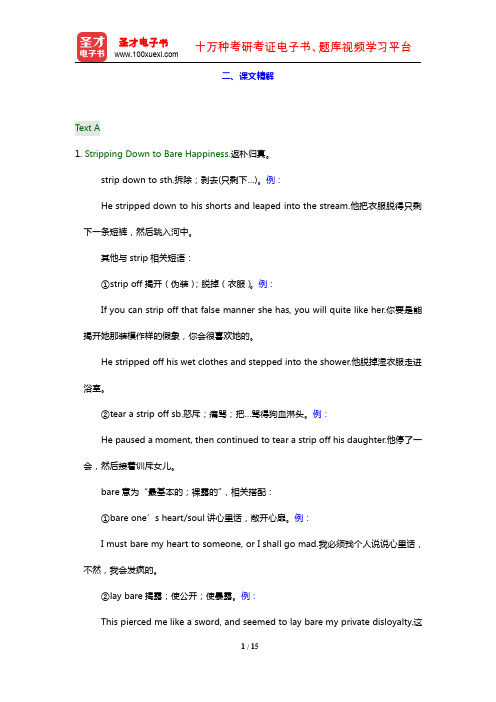
二、课文精解Text A1.Stripping Down to Bare Happiness.返朴归真。
strip down to sth.拆除;剥去(只剩下…)。
例:He stripped down to his shorts and leaped into the stream.他把衣服脱得只剩下一条短裤,然后跳入河中。
其他与strip相关短语:①strip off揭开(伪装);脱掉(衣服)。
例:If you can strip off that false manner she has,you will quite like her.你要是能揭开她那装模作样的假象,你会很喜欢她的。
He stripped off his wet clothes and stepped into the shower.他脱掉湿衣服走进浴室。
②tear a strip off sb.怒斥;痛骂;把…骂得狗血淋头。
例:He paused a moment,then continued to tear a strip off his daughter.他停了一会,然后接着训斥女儿。
bare意为“最基本的;裸露的”,相关搭配:①bare one’s heart/soul讲心里话,敞开心扉。
例:I must bare my heart to someone,or I shall go mad.我必须找个人说说心里话,不然,我会发疯的。
②lay bare揭露;使公开;使暴露。
例:This pierced me like a sword,and seemed to lay bare my private disloyalty.这句话象一把利剑刺透了我,似乎把我私下的不忠不义揭露了出来。
bare与naked均有“裸露的”之意,区别:bare形容物时,指没有遮盖或装饰;形容人时,指身体某一部位裸露。
naked形容人时,指完全不穿衣服,一丝不挂;还可指“无掩饰的、坦白的、赤裸裸的”。
新标准大学英语第四册-unit-7-active-reading-1-课文及译文
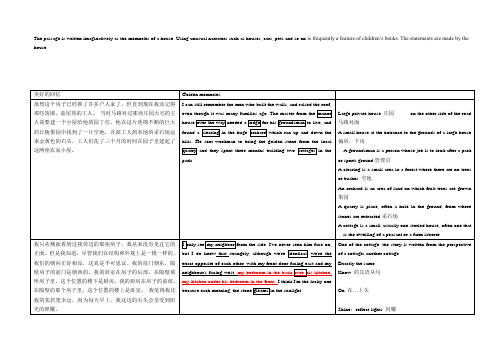
Large private house 庄园 马路对面
on the other side of the road
A small house at the entrance to the grounds of a large house 偏房,下房
A groundsman is a person whose job is to look after a park or sports ground 管理员
水仙 郁金香 菊花 there was a large amount of various types of colors; Blossom: flower esp. of a fruit-bearing tree
没过多久,又有孩子要照看了。头一个孩子是女孩,她常常 Soon there were children to look after too, first a girl, who gurgled
四周的土地上全是一片忙碌的景象,帮工们采摘水果,把摘 and pears, and as the days grew shorter the land around was busy
下的水果送到庄园或是沿着那条路运到镇上的市场去卖。
with helpers collecting the fruit to take to the manor house, or to
Golden memories I can still remember the men who built the walls, and raised the roof, even though it was many families ago. The master from the manor house over the way needed a lodge for his groundsman to live, and found a clearing in the huge orchard which ran up and down the hills. He sent workman to bring the golden stone from the local quarry and they spent three months building two cottages in the park.
新世纪大学英语(第二版)综合教程第4册Unit7
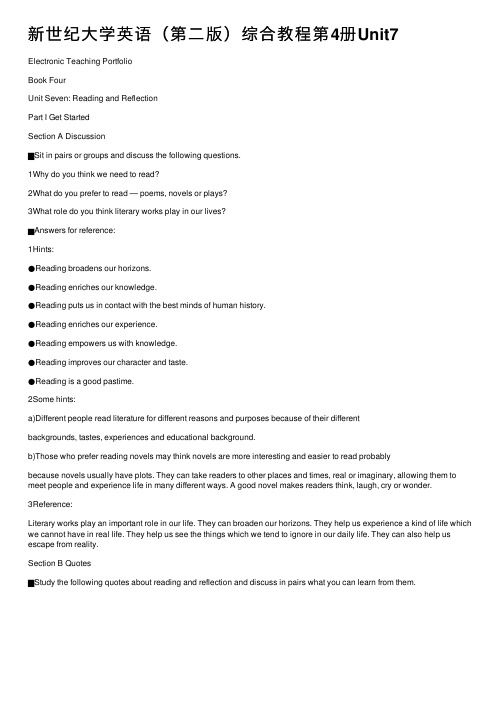
新世纪⼤学英语(第⼆版)综合教程第4册Unit7Electronic Teaching PortfolioBook FourUnit Seven: Reading and ReflectionPart I Get StartedSection A Discussion▇Sit in pairs or groups and discuss the following questions.1Why do you think we need to read?2What do you prefer to read — poems, novels or plays?3What role do you think literary works play in our lives?▆Answers for reference:1Hints:●Reading broadens our horizons.●Reading enriches our knowledge.●Reading puts us in contact with the best minds of human history.●Reading enriches our experience.●Reading empowers us with knowledge.●Reading improves our character and taste.●Reading is a good pastime.2Some hints:a)Different people read literature for different reasons and purposes because of their differentbackgrounds, tastes, experiences and educational background.b)Those who prefer reading novels may think novels are more interesting and easier to read probablybecause novels usually have plots. They can take readers to other places and times, real or imaginary, allowing them to meet people and experience life in many different ways. A good novel makes readers think, laugh, cry or wonder.3Reference:Literary works play an important role in our life. They can broaden our horizons. They help us experience a kind of life which we cannot have in real life. They help us see the things which we tend to ignore in our daily life. They can also help us escape from reality.Section B Quotes▇Study the following quotes about reading and reflection and discuss in pairs what you can learn from them.Francis Bacon⊙Some books are to be tasted; others to be swallowed; and some few to be chewed and digested.— Francis Bacon Interpretation:There are different ways of reading books. To taste a book, one can read it in a state of relaxation. To swallow a book one can glide his eyes across the lines of a book. To chew or digest a book one should read it actively. And when he has finished reading a book, the pages are filled with his notes. Only when good books are chewed and digested can they have a lasting influence on one’s life.About Francis Bacon (1561-1626): an English politician, philosopher, and writer. Francis Bacon graduated from Trinity College, Cambridge. He was the founder of English materialist philosophy, as well as of modern science in England. He is especially famous for his Essays, in which his practical wisdom is shown through his reflections and comments on rather abstract subjects.Benjamin Franklin◎Reading makes a full man, meditation a profound man, discourse a clear man.— Benjamin FranklinInterpretation:Reading broadens our horizons, molds our temperament and enlightens our minds. Reading provides us with the possibility of opening ourselves up to the world, which helps us to become learned and knowledgeable persons. Thinking deeply helpsus gain an insight into human life. Having scholarly conversations with others helps us become wiser.About Benjamin Franklin (1706-1790): a US politician, writer, and scientist. He was involved in writing two historically significant documents, the Declaration of Independence (《独⽴宣⾔》) and the Constitution of the United States (《美国宪法》). He is famous for proving that lightning is a form of electricity by doing a scientific test in which he flew a kite during a storm, and he invented the lightning conductor. He is also well known for his literary works such as Poor Richard’s Almanac (《穷理查德年鉴》1732-1757;亦译作《格⾔历书》、《穷理查历书》) and Autobiography (《⾃传》1790).Denis Parsons Burkitt◎It is better to read a little and ponder a lot than to read a lot and ponder a little.— Denis Parsons BurkittInterpretation:What really counts is not how many books we have read but whether we spend time thinking over what we have read. So we should read selectively and reflectively.About Denis Parsons Burkitt (1911–1993): an accomplished British surgeon. His major contribution to medical science was the description, distribution, and ultimately, the etiology (病因学;病源论) of apediatric (⼩⼉科的) cancer that bears his name Burkitt’s lymphoma (伯基特⽒淋巴瘤).Louisa May Alcott◎Good books, like good friends, are few and chosen; the more select, the more enjoyable.— Louisa May AlcottInterpretation:Books and friends should be few but good. We should be highly selective in reading books, and our greatest pleasure in reading comes from the best books.About Louisa May Alcott (1832–1888): an American novelist best known as author of the novel Little Women (《⼩妇⼈》). Section C Watching and Discussion▇Watch the following video clip “Reading Really Matters” and do the tasks that follow.Introduction of the video:Dana Gioia, Chairman of the National Endowment for the Arts, is talking about arts education.First he mentions a problem in the United States: People are reading less and employers are facing a serious problem that their new employees can’t read and can’t write.According to Dana Gioia, those people who read do exercise more and do more volunteering charity work.Then he comes to talk about how reading actually matters to a person.1 Now fill in the note form according to what you hear.Topic: Reading Awakens Something inside the Reader1) reading increases your sense of your own personal destiny.2) reading makes the lives of other people more real to you.In summary, reading makes you understand that other people have an inner life as complicated as your own.Reading builds a society with not only imaginative capability, intellectual capability, but compassion, and humanity.2Discuss the following questions.Do you agree that Chinese people are reading less?Do you think modern technology has influenced the way people read?Open.▇Script:Americans are reading less. Because they read less, they read less well. Because they read less well, they do less well in the educational system. We are in the process in the United States of producing the first generation in our history that’s less well-educated than their parents. Now, I mean, to me, this is, you know a…an abandonment of the whole American misroutes of self improvement. Because they do less well in school, they do less well in the job market and economically. The number one problems for new employers in the United States: new employees can’t read, new employees can’t write. And in fact, for those people who can’t even read above the basic level, 55% of those people end up unemployed.And even on a further level, they overwhelmingly are like, you know, are more likely to end up in the criminal justice system. Only 3% of the people in U.S. prisons read at a proficiency level. Because they read less well, you know, because in a sense they don’t develop these things, they are a lso less likely to be engaged in personal positive behavior however you wanna measure it.We can measure it many different ways. You would not think it, but it is overwhelmingly demonstrable: that people that read exercise more; people that read join, play sports more. They belong to civic organizations more. They do volunteering charity work nearly 4 times the level of non-readers.Well, when I saw these data, I said, well, wait. We have to be measuring something else. W e’re measuring income, and we’re measuring education. If you take the poorest people in the United States who read, they do volunteering charity work at twice the level of people who don’t read. So what does it say to us? It says something we know, each of us knows this: when you read, when you’re engaged in the arts, it awakens something inside of you. That does two things: the first is that it increases your sense of your own personal destiny. But, secondly, it makes the lives of other people more real to you. It creates a heightened sense of yourself as an individual, but it also brings you, maybe, especially when you’re reading novels or imagin ing the literature in which you follow the stories, the lives of the people in the dailiness of their existence, socially, economically. Maybe understanding, a man understanding how a woman thinks, and a man understanding how a man thinks, a person understanding how somebody from a different country, from a different race thinks and feels. This imaginative exercises, this meditative exercise, makes you understand that other people have an inner life as complicated as your own. And so, if you have a society, in which tens of millions of people guided by pleasure no less, undertake these types of contemplations and meditations, you have a society which builds… not only it’s imaginative capability, it’s intellectual capability, b ut it’s compassion, and it’s humanity.Part II Listen and RespondSection B Task One: Focusing on the Main Ideas▇Choose the best answer to each of the following questions according to the information contained in the listening passage. 1What does the speaker mean by efficient reading or reading efficiently?A)Reading a book for pleasure.B)Writing between lines while reading.C)Remembering the author’s thoughts.D)Scanning a book for facts.2What is the advantage of marking up a book according to the speaker?A)Marking up a book helps readers take in the brilliant ideas in the book.B)Marking up a book enables readers to know what they read.C)Marking up a book makes readers feel like the owner of the book.D)Marking up a book makes readers conscious of the fact that they are reading actively.3What is the true sense of owning a book?A)Marking it through active reading.B)Purchasing it with one’s own money.C)Writing one’s name on it.D)Understanding every word in it.4How do people read books for pleasure?A)They read them consciously.B)They read them in a state of relaxation.C)They read them passively.D)They read them actively.5How do people know they have read actively when they finish reading a book?A)They establish a relationship with the author.B)They gain possession of the book.C)The pages are full of their notes.D)Their spoken language has been improved.▇Key:1) B 2) D 3) A 4) B 5) CSection C Task Two: Zooming In on the Details▇Listen to the recording again and fill in each of the blanks according to what you have heard.Why is mar king up a book indispensable to reading it? First, it keeps you 1) ________. And I don’t mean merely 2)________; I mean wide awake. In the second place, reading, if it is 3) ________, is thinking, and thinking tends to 4)________ itself in words, spoken or written. The marked book is usually the thought-through book. Finally, writing helps you remember the 5) ________ you had, or the thoughts the author expressed.If reading is to 6) ________ anything more than passing time, it must be active. You can’t let your eyes glide across the lines of a book and come up with an 7) ________ of what you have read. The books you read for pleasure can be read in a state of 8) ________ and nothing is lost. But a great book, rich in ideas and beauty, a book that 9) ________ and tries to answer fundamental questions, 10) ________ the most active reading. When you’ve finished rea ding a book, and the pages are filled with your notes, you know that you read actively.▇Answers:1)awake 2) conscious 3) active 4) express 5) thoughts6) accomplish 7) understanding 8) relaxation 9) raises 10) demands▇Script:Reading EfficientlyYou know you have to read ―between the line s‖ to get the most out of anything. I want to persuade you to do something equally important in the course of your reading, that is: ―write between the lines‖. Unless you do, you are not likely to do the most efficient kind of reading. I contend that marking up a book is an act of love.There are two ways in which one can own a book. The first is the property right you establish by paying for it, just as you pay for clothes and furniture. But this act of purchase is only the prelude to possession. Full ownership comes only when you have made it a part of yourself, and the best way to make yourself a part of it is by writing in it.Why is mar king up a book indispensable to reading? First, it keeps you awake. And I don’t mean merely conscious; I meanwide awake. In the second place, reading, if it is active, is thinking, and thinking tends to express itself in words, spoken or written. The marked book is usually the thought-through book. Finally, writing helps you remember the thoughts you had, or the thoughts the author expressed.If reading i s to accomplish anything more than passing time, it must be active. You can’t let your eyes glide across the lines of a book and come up with an understanding of what you have read. The books you read for pleasure can be read in a state of relaxation and nothing is lost. But a great book, rich in ideas and beauty, a book that raises and tries to answer fundamental questions, demands the most active reading. When you’ve finished reading a book, and the pages are filled with your notes, you know that you read actively.Part III Read and ExploreText ASection A Discovering the Main IdeasExercise 1 Answer the following questions with the information contained in Text A.1What is the difference between the lives of those who read and those who do not?2Can reading newspapers be categorized as reading? Why or why not?3What is the art of reading according to the author?4What does the author think of ―the taste for reading‖?5Can people benefit from reading the same books at different ages? Why or why not?▇Answers for reference:1According to the author, those who do not read are just like prisoners confined to their immediate world in respect to time and space. Their life falls into a set of routines and they see only what happens in their immediate neighbourhood with few friends and acquaintances to communicate with. In contrast, those who read have the privilege to escape temporarily from the present world and enter a different country ora different age as soon as they pick up a book. Good books put them in touch with the best minds inhistory and they are always carried away into a world of thought and reflection. Books broaden their horizons and their life is never a set of dull routines.2According to the author, reading newspapers does not belong to the category of reading because the average reader of a newspaper is mainly concerned with getting reports about events and happenings without contemplative value. The best reading does not merely offer a report of events, but is able to lead readers into a contemplative mood.3According to the author, only reading with the object of enriching one’s charm and flavor can be called an art. The charm here is not related to one’s physical appearance, but one’s inner aura of elegance which canonly be acquired through reading. And flavor here refers to the flavor in speech, and its cultivation entirely depends on one’s way of reading.4The author thinks that taste is the key to all reading and is individual and selective. Each person has his own taste in the kinds of books he enjoys reading. Forcing one to read books that he dislikes will achieve no positive results.5Yes. People can benefit from reading the same book at different ages and get different flavors out of it.According to the author, people at different ages should read different kinds of books and good books can be read more than once at different ages.Exercise 2 Text A can be divided into four parts with the paragraph number(s) of each part provided as follows. Write down the main idea of each part.Section B In-depth StudyIn the following text, Lin Yutang, the Chinese writer, translator, linguist and inventor, shares with us his insight into reading as an art. He not only addresses such questions as why to read, what to read, and when to read, but also convinces us of the beauty and benefits of reading as an art.The Art of ReadingLin Yutang1 Reading or the enjoyment of books has always been regarded among the charms of a cultured life and is respected and envied by those who rarely give themselves that privilege. This is easy to understand when we compare the difference between the life of a man who does no reading and that of a man who does.2 The man who has not the habit of reading is imprisoned in his immediate world, in respect to time and space. His life falls into a set routine; he is limited to contact and conversation with a few friends and acquaintances, and he sees only what happens in his immediate neighborhood. From this prison there is no escape. But the moment he takes up a book, he immediately enters a different world, and if it is a good book, he is immediately put in touch with one of the best talkers of the world. This talker leads him on and carries him into a different country or a different age, or unburdens to him some of his personal regrets, or discusses with him some special line or aspect of life that the reader knows nothing about. An ancient author puts him in communion with a dead spirit of long ago, and as he reads along, he begins to imagine what that ancient author looked like and what type of person he was. Both Mencius and Ssema Ch’ien have expressed the same idea. Now to be able to live two hours out of twelv e in a different world and take one’s thoughts off the claims of the immediate present is, of course, a privilege to be envied by people shut up in their bodily prison.3 Such a change of environment is really similar to travel in its psychological effect. But there is more to it than this. The reader is always carried away into a world of thought and reflection. Even if it is a book about physical events, there is a difference between seeing such events in person or living through them, and reading about them in books, for then the events always assume the quality of a spectacle and the reader becomes a detached spectator. The best reading is therefore that which leads us into this contemplative mood, and not that which is merely occupied with the report of events. The tremendous amount of time spent on newspapers I regard as not reading at all, for the average readers of papers are mainly concerned with getting reports about events and happenings without contemplative value.4 The best formula for the object of reading, in my opinion, was stated by Huang Shanku, a Sung poet. He said, ―A scholar who hasn’t read anything for three days feels that his talk has no flavor, and his own face becomes hateful to look at.‖ What he means, of course, is that reading g ives a man a certain charm and flavor, which is the entire object of reading, and onlyreading with this object can be called an art. One doesn’t read to ―improve one’s mind,‖ because when one begins to think of improving his mind, all the pleasure of read ing is gone. He is the type of person who says to himself: ―I must read Shakespeare, and I must read Sophocles, and I must read the entire Five Foot Shelf of Dr. Eliot, so I can become an educated man.‖ I’m sure that man will never become educated. He will force himself one evening to read Shakespeare’s Hamlet and come away, as if from a bad dream, with no greater benefit than that he is able to say that he has ―read‖Hamlet. Anyone who reads a book with a sense of obligation does not understand the art of reading.5 Reading for the cultivation of personal charm of appearance and flavor in speech is then, according to Huang, the only admissible kind of reading. This charm of appearance must evidently be interpreted as something other than physical beauty. W hat Huang means by ―hateful to look at‖ is not physical ugliness. As for flavor of speech, it all depends on one’s way of reading. Whether one has ―flavor‖ or not in his talk, depends on his method of reading. If a reader gets the flavor of books, he will show that flavor in his conversations, and if he has flavor in his conversations, he cannot help also having a flavor in his writing.6 Hence I consider flavor or taste as the key to all reading. It necessarily follows that taste is selective and individual, like the taste for food. The most hygienic way of eating is, after all, eating what one likes, for then one is sure of his digestion. In reading as in eating, what is one man’s meat may be another’s poison. A teacher cannot force his pupils to like what he likes in reading, and a parent cannot expect his children to have the same tastes as himself. And if the reader has no taste for what he reads, all the time is wasted.7 There can be, therefore, no books that one absolutely must read. For our intellectual interests grow like a tree or flow like a river. So long as there is proper sap, the tree will grow anyhow, and so long as there is fresh current from the spring, the water will flow. When water strikes a cliff, it just goes around it; when it finds itself in a pleasant low valley, it stops and meanders there a while; when it finds itself in a deep mountain pond, it is content to stay there; when it finds itself traveling over rapids, it hurries forward. Thus, without any effort or determined aim, it is sure of reaching the sea some day. There are no books in this world that everybody must read, but only books that a person must read at a certain time in a given place under given circumstances and at a given period of his life. I rather think that reading, like matrimony, is determined by fate or yinyuan. Even if there is a certain book that every one must read, there is a time for it. When one’s thoughts and experience have not reached a certain point for reading a masterpiece, the masterpiece will leave only a badflavor on his palate. Confucius said, ―When one is fifty, one may read the Book of Changes,‖ which means that one should not read it at forty-five. The extremely mild flavor of Confucius’ own sayings in The Analects and his mature wisdom cannot be appreciated until one becomes mature himself.8 Furthermore, the same reader reading the same book at different periods gets a different flavor out of it. For instance, we enjoy a book more after we have had a personal talk with the author himself, or even after having seen a picture of his face, and one gets again a different flavor sometimes after one has broken off friendship with the author. A person gets a kind of flavor from reading the Book of Changes at forty, and gets another kind of flavor reading it at fifty, after he has seen more changes in life. Therefore, all good books can be read with profit and renewed pleasure a second time.9 Reading, therefore, is an act consisting of two sides, the author and the reader. The net gain comes as much from the reader’s contribution through his own insight and experience as from the author’s own. I regard the discovery of one’s favorite author as the most critical event in one’s intellectual development. There is such a thing as the affinity of spirits, and among the authors of ancient and modern times, one must try to find an author whose spirit is akin with his own. Only in this way can one get any real good out of reading.▇课⽂参考译⽂读书的艺术林语堂1 读书或书籍的享受素来被视为有修养的⽣活上的⼀种雅事,⽽在⼀些不⼤有机会享受这种权利的⼈们看来,这是⼀种值得尊重和妒忌的事。
21世纪大学英语综合教程4Unit7-A
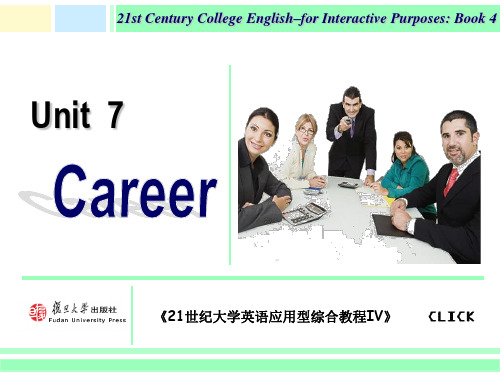
Words/expressions describing how a job can make you feel: excited, bored, stressed, depressed
Pause
Play
Stop
Unit 7: Theme-related Information
Directions: Listen to the story.
The power struggle
From BBC “English at Work”
(APRAananucnnlhaa:e:lo:n NAfmOtcohaaohamgenyh,.ecirt,ylaohibwagmee,rhreep?Itlwe.alu… switeteohekrn,h.woseBauirnuredgptosilIhnfat’feognmicitsemon.faohTnteahdarcigestAieaeoilsnfln)bynR”uasatoucisrht,reey“slypo.otlrhetuea’osrfe,
Unit 1: Theme-related Information
Unit 1: Theme-related Information
Unit 1: Theme-related Information
Unit 7: Theme-related Information
Directions: What do you think of “The High and Low-paying Jobs ” in the video clip?
大学英语综合教程4unit7themonster

UNIT 7 The monsterThe author:Joseph Deems Taylor (December 22, 1885 –July 3, 1966) was an American composer, music critic, and promoter of classical music. Nat Benchley, co-editor of The Lost Algonquin Roundtable, referred to him as "the dean of American music." Social background:This text first appeared as a radio talk, entitled A Monster. Later it was published with the title Of Men and Music in the United States in 1937.Main idea: the text argues that Richard Wagner’s monstrous behavior can beforgiven because of his miraculous achievements in music. This essay on a famous man, whose name is not revealed until almost the end of the piece, is a study of monstrous conceit. Filled with biographical details that keep the reader guessing to the last moment, the essay concludes with a challenging view on the nature of genius: if a genius was so prolific, “is it any wonder that he had no time to be a man?”The structure:Part One:Para. 1-9The author describes the problems of the monsterPart Two:Para. 10 The author tells us who the monster is—Richard Wagner Part Three:Para. 11-13 Theauthor describes Wagner as a music genius and express his admiration Rhetorical features: Metaphor(暗喻,隐喻)He had the emotional stability of a six- year- old child.Comment:after reading this text, my heart is a little contradictory. Because the author makes a list of his intolerable oddities at first, but through the transitional paragraph, he forgives this monster because of hismiraculous achievements in music in his little space of seventy years. There is an obvious contrast of himself. In fact, we all know everyone has disadvantages and advantages in life. No one is perfect. We should make a dialectic view for everyone. But I don’t agree with author for his view. Because his some bed habits or behaviors make bed effects for people around himself exactly. We can’t forgive himself completely just because his achievements. Some of his behaviors should be corrected.。
21世纪大学英语第四册课文翻译7--8
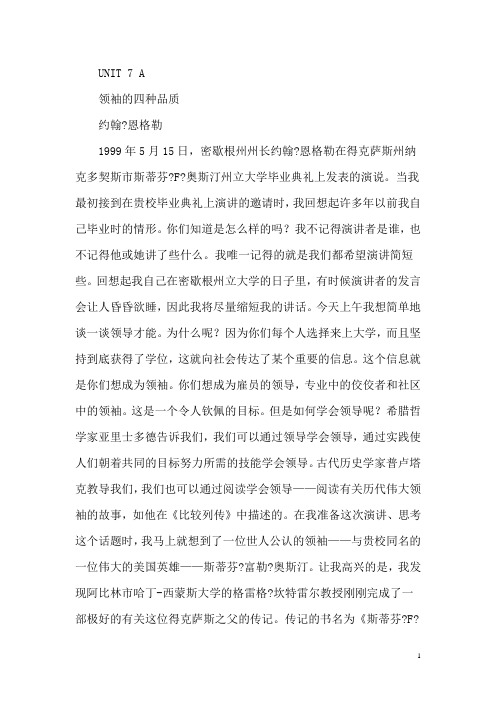
UNIT 7 A领袖的四种品质约翰?恩格勒1999年5月15日,密歇根州州长约翰?恩格勒在得克萨斯州纳克多契斯市斯蒂芬?F?奥斯汀州立大学毕业典礼上发表的演说。
当我最初接到在贵校毕业典礼上演讲的邀请时,我回想起许多年以前我自己毕业时的情形。
你们知道是怎么样的吗?我不记得演讲者是谁,也不记得他或她讲了些什么。
我唯一记得的就是我们都希望演讲简短些。
回想起我自己在密歇根州立大学的日子里,有时候演讲者的发言会让人昏昏欲睡,因此我将尽量缩短我的讲话。
今天上午我想简单地谈一谈领导才能。
为什么呢?因为你们每个人选择来上大学,而且坚持到底获得了学位,这就向社会传达了某个重要的信息。
这个信息就是你们想成为领袖。
你们想成为雇员的领导,专业中的佼佼者和社区中的领袖。
这是一个令人钦佩的目标。
但是如何学会领导呢?希腊哲学家亚里士多德告诉我们,我们可以通过领导学会领导,通过实践使人们朝着共同的目标努力所需的技能学会领导。
古代历史学家普卢塔克教导我们,我们也可以通过阅读学会领导——阅读有关历代伟大领袖的故事,如他在《比较列传》中描述的。
在我准备这次演讲、思考这个话题时,我马上就想到了一位世人公认的领袖——与贵校同名的一位伟大的美国英雄——斯蒂芬?富勒?奥斯汀。
让我高兴的是,我发现阿比林市哈丁-西蒙斯大学的格雷格?坎特雷尔教授刚刚完成了一部极好的有关这位得克萨斯之父的传记。
传记的书名为《斯蒂芬?F?奥斯汀:得克萨斯的创业者》,今年十月将由耶鲁大学出版社公开发行。
我有机会读了分页校样。
作者的中心主题是奥斯汀作为一个领袖的伟大品质。
这位得克萨斯之父具有四种品质使他得以将边远地区一群粗鲁的个人主义者变成了一个具有凝聚力的集体。
今天上午,我想与你们一起分享这些品质。
我推崇这些品质,因为它们同我在为公众服务的30年中所得出的经验是一致的。
这些品质不受时间限制,你们如果拥有它们,就会成为更出色的领导者。
首先是前景目标。
要有一个前景目标。
奥斯汀无疑清晰地知道他想达到一个什么目标。
21世纪大学实用英语综合教程(第四册)课后翻译答案(有汉语)
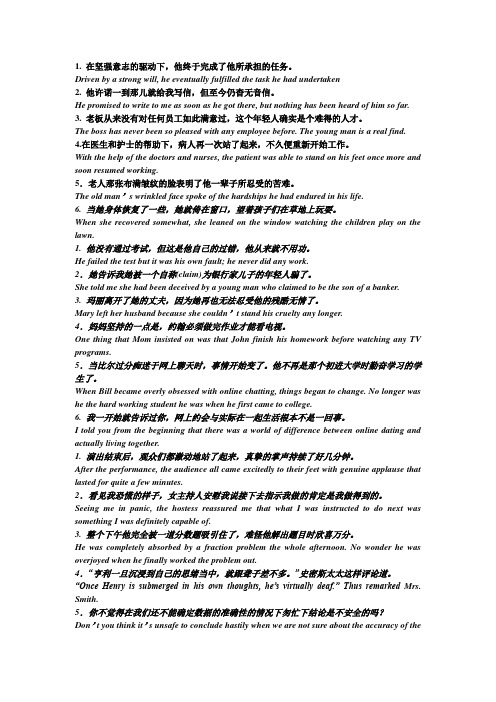
1. 在坚强意志的驱动下,他终于完成了他所承担的任务。
Driven by a strong will, he eventually fulfilled the task he had undertaken2. 他许诺一到那儿就给我写信,但至今仍杳无音信。
He promised to write to me as soon as he got there, but nothing has been heard of him so far. 3. 老板从来没有对任何员工如此满意过,这个年轻人确实是个难得的人才。
The boss has never been so pleased with any employee before. The young man is a real find. 4.在医生和护士的帮助下,病人再一次站了起来,不久便重新开始工作。
With the help of the doctors and nurses, the patient was able to stand on his feet once more and soon resumed working.5.老人那张布满皱纹的脸表明了他一辈子所忍受的苦难。
The old man’s wrinkled face spoke of the hardships he had endured in his life.6. 当她身体恢复了一些,她就倚在窗口,望着孩子们在草地上玩耍。
When she recovered somewhat, she leaned on the window watching the children play on the lawn.1. 他没有通过考试,但这是他自己的过错,他从来就不用功。
He failed the test but it was his own fault; he never did any work.2.她告诉我她被一个自称(claim)为银行家儿子的年轻人骗了。
21世纪大学实用英语综合教程4课文翻译
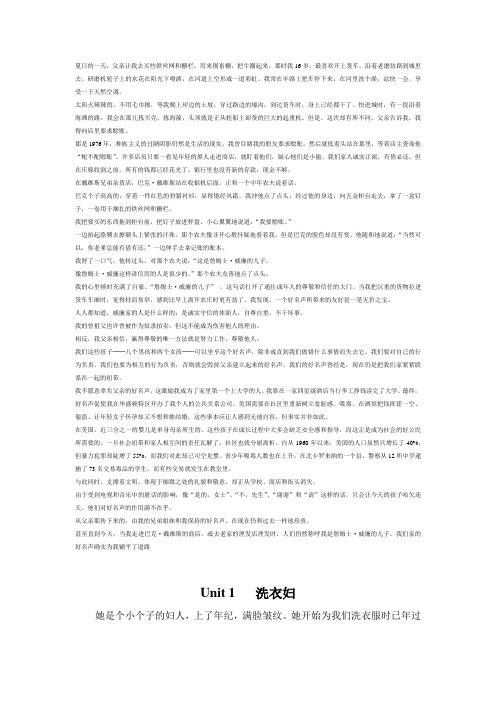
夏日的一天,父亲让我去买些铁丝网和栅栏,用来围畜棚,把牛圈起来。
那时我16岁,最喜欢开上货车,沿着老磨坊路到城里去。
研磨机轮子上的水花在阳光下喷洒,在河道上空形成一道彩虹。
我常在半路上把车停下来,在河里洗个澡,凉快一会,享受一下天然空调。
太阳火辣辣的,不用毛巾擦,等我爬上岸边的土坡,穿过路边的壕沟,到达货车时,身上已经都干了。
快进城时,有一段沿着海滩的路,我会在那儿拣贝壳,拣海藻,头顶就是正从轮船上卸货的巨大的起重机。
但是,这次却有所不同。
父亲告诉我,我得向店里要求赊账。
那是1976年,种族主义的丑陋阴影仍然是生活的现实。
我曾目睹我的朋友要求赊账,然后就低着头站在那里,等着店主查询他“配不配赊账”。
许多店员只要一看见年轻的黑人走进商店,就盯着他们,疑心他们是小偷。
我们家人诚实正派,有债必还。
但在庄稼收割之前,所有的钱都已经花光了。
银行里也没有新的存款,现金不够。
在戴维斯兄弟杂货店,巴克·戴维斯站在收银机后面,正和一个中年农夫说着话。
巴克个子高高的,穿着一件红色的狩猎衬衫,显得饱经风霜。
我冲他点了点头,经过他的身边,向五金柜台走去,拿了一盒钉子,一卷用于捆扎的铁丝网和栅栏。
我把要买的东西拖到柜台前,把钉子放进秤盘,小心翼翼地说道:“我要赊账。
”一边抬起胳膊去擦额头上紧张的汗珠。
那个农夫像寻开心般怀疑地看着我,但是巴克的脸色却没有变。
他随和地说道:“当然可以,你老爹总能有借有还,”一边伸手去拿记账的账本。
我舒了一口气。
他转过头,对那个农夫说:“这是詹姆士·威廉的儿子。
像詹姆士·威廉这样讲信用的人是很少的。
”那个农夫友善地点了点头。
我的心里顿时充满了自豪。
“詹姆士·威廉的儿子”,这句话打开了通往成年人的尊敬和信任的大门。
当我把沉重的货物拉进货车车厢时,觉得轻而易举,感到比早上离开农庄时更有劲了。
我发现,一个好名声所带来的友好是一笔无价之宝。
人人都知道,威廉家的人是什么样的:是诚实守信的体面人,自尊自重,不干坏事。
- 1、下载文档前请自行甄别文档内容的完整性,平台不提供额外的编辑、内容补充、找答案等附加服务。
- 2、"仅部分预览"的文档,不可在线预览部分如存在完整性等问题,可反馈申请退款(可完整预览的文档不适用该条件!)。
- 3、如文档侵犯您的权益,请联系客服反馈,我们会尽快为您处理(人工客服工作时间:9:00-18:30)。
24 Gates was born in Seattle, Wash., in 1955. As a boy, he was bright and curious. He especially loved hiking, camping and other outdoor adventures.
要感谢微软,盖茨现在是在美国最富有的人之一。他赚取了超过80亿美元。
27 A technical wizard and a fierce business competitor, Gates sees great things ahead for computers. He says they "are realபைடு நூலகம்y going to change a lot of things in the world --- the way we work, the way we play and entertain ourselves and even the way we are educated."
1955年盖茨在西雅图出世。作为一个男孩,他是阳光和有好奇心。他特别喜欢远足,露营和其它户外探险活动。
25 But Gates was obsessed with computers. While a student at Harvard University in 1975, Gates and a friend, Paul Allen, developed a computer language for an early version of the personal computer. Microsoft was born. Gates went on to develop operating systems, such as MS-DOS, and software programs.
一个技术天才和厉害的商业竞争者,盖茨看到伟大的事情将发生在电脑上。他说他们“真的要改变世界上的很多事情,我们的工作方式,我们玩耍和娱乐自己,还有我们的教育方式。”
苹果II是超过一个玩具。人们可以用它来写信,保持财务记录和教育他们的孩子。而且可以用它玩游戏。苹果II演变成今天的高科技麦金塔电脑。这些计算机普及了鼠标的使用。鼠标是移动计算机显示器上光标的手控设备。
23 Most of the computers in the world use software invented by Bill Gates, the founder of Microsort inc. of Redmond, Wash. Software is the set of programs that make computers -- whether business or personal --perform various tasks.
但盖茨迷上了电脑。1975年作为哈佛大学的学生,盖茨和一个朋友,保罗艾伦,开发了一种用于个人计算机的一个早期版本的计算机语言。到微软成立,盖茨继续开发的操作系统,如MS-DOS,和软件程序。
26 Thanks to Microsoft, Gates is now one of the richest men in America. He is worth more than $8 billion.
22 The Apple II was more than a toy. People could use it to write letters, keep financial records and teach their children. And, yes, they could play games in it. The Apple II evolved into today's high-tech Macintosh computers. These computers popularized the use of the mouse. the hand-controlled device that moves cursor on a computer display.
